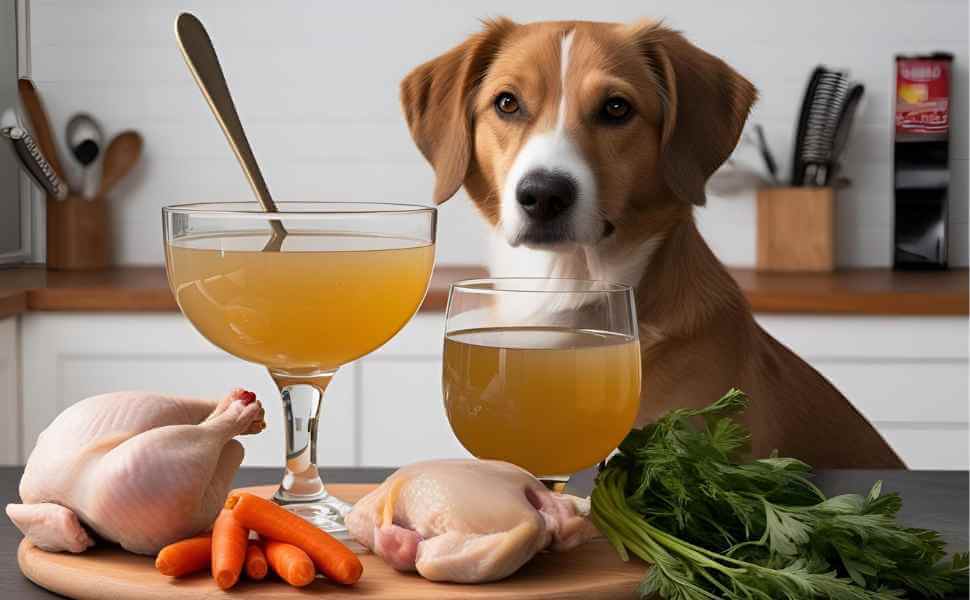Chicken broth is gaining popularity among dog owners for its numerous health benefits. This article will explore 7 Amazing Benefits of Chicken Broth for Dogs and why it should be a part of your pup’s diet. This nutritious liquid is made by simmering chicken bones, meat, and cartilage, packed with essential nutrients like glucosamine, amino acids, and minerals that support overall canine health. Not only does it enhance meal flavour, but it also helps with joint health, digestion, hydration, Immunity, and more. Let’s dive into why your dog can benefit from this delicious supplement.
Benefits of Chicken Broth for Dogs
Supports Joint Health
Chicken broth can be a game changer if your dog ages or struggles with joint issues. It contains glucosamine and chondroitin, which promote joint health and reduce arthritis symptoms. Regular consumption can help maintain mobility and prevent stiffness.
Improves Digestion and Gut Health
Rich in collagen, chicken broth supports gut health by strengthening the intestinal lining. It is especially beneficial for dogs with digestive issues like diarrhoea, leaky gut, or a sensitive stomach.
Enhances hydration
Many dogs don’t drink enough water, leading to dehydration. Chicken broth is a flavorful way to boost fluid intake, making it an excellent option for sick, elderly, or less active dogs. Its electrolyte content also helps restore hydration levels.

Boosts Immunity
Chicken broth contains vital vitamins and minerals, such as calcium, magnesium, and phosphorus, strengthening the immune system. Additionally, amino acids like glycine and proline help fight inflammation and infections.
Encourages Appetite in Picky Eaters
Does your dog refuse to eat? Chicken broth can make meals more enticing. A drizzle over dry kibble can encourage even the pickiest eater to enjoy their food, making it an excellent option for dogs recovering from illness or surgery.
Promotes Healthy Skin and a Shiny Coat
The collagen and amino acids in chicken broth contribute to healthier skin and a shinier coat. If your dog suffers from dry, itchy skin or excessive shedding, adding chicken broth to their diet may improve their overall skin condition.
Aids in Weight Management
Chicken broth is an excellent addition to a weight management plan. It is low in calories but rich in nutrients, helping dogs feel full without consuming excess calories. Replacing high-calorie treats with frozen broth cubes can be a healthy alternative.
How to Make Homemade Chicken Broth for Dogs
Ingredients to Use and Avoid
When preparing chicken broth for your dog, use natural ingredients like chicken bones, water, and apple cider vinegar. Avoid harmful additives like onions, garlic, excess salt, and artificial preservatives, which can be toxic to dogs.
Step-by-Step Recipe
- Place chicken bones in a pot and cover them with water.
- Add a tablespoon of apple cider vinegar to extract nutrients.
- Simmer on low heat for 12-24 hours.
- Strain the liquid, remove bones, and let it cool.
- Store in the refrigerator for up to a week or freeze for long-term use.
Best Ways to Serve Chicken Broth to Your Dog
- Pour it over dry kibble for added flavour.
- Freeze it into ice cubes as a refreshing treat.
- Use it as a base for homemade dog food recipes.
Conclusion
Chicken broth is a simple yet powerful addition to your dog’s diet. The benefits are undeniable, from improving joint health to boosting Immunity and hydration. Try incorporating it into your pup’s meals and watch them thrive!
FAQs
Can I give my dog store-bought chicken broth?
Yes, but ensure it is free from onions, garlic, artificial preservatives, and added salt.
How much chicken broth should I give my dog?
A few tablespoons per meal are sufficient. Adjust based on your dog’s size and dietary needs.
Can puppies have chicken broth?
Yes! It is safe for puppies and supports their growth, digestion, and immune system.
Are there any risks of feeding chicken broth to dogs?
Only if it contains harmful ingredients like garlic, onions, artificial preservatives, or excessive sodium.
Can chicken broth replace water for dogs?
No, but it can supplement their hydration alongside fresh water.










